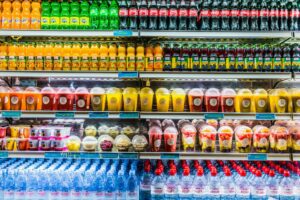The Smart Sustainable Plastic Packaging (SSPP) Challenge has announced £30 million in funding for 18 groundbreaking collaborative projects.
UK Research and Innovation’s (UKRI) Smart Sustainable Plastic Packaging (SSPP) Challenge has announced £30 million in funding for 18 groundbreaking collaborative projects that support the achievement of the UK Plastics Pact and have the potential to alter the UK’s relationship with, and management of, plastic packaging.
The SSPP Challenge represents the largest Government investment into sustainable plastic packaging and waste management, and the results of the two funding competitions announced today see 5 large-scale demonstrator projects and 13 business-led research and development projects benefit from this backing.
Each has demonstrated its value in addressing the need to transform the UK’s retail and packaging supply chains and support the development of more sustainable approaches to plastic packaging use through a range of circular economy business models, novel polymer materials and new recycling technologies.
Large-scale demonstrator projects
The successful large scale Demonstrator projects are focused on three key packaging challenges: reuse and refill, food grade polypropylene recycling, and films and flexible packaging recycling.
CLEANSTREAM technology
Polypropylene (PP) accounts for around 20% of the world’s plastic, and is predominantly used to make pots, tubs, and trays for food applications, as well as packaging for personal care and household chemical products. However, as there is no approved food-grade method for the mechanical recycling of PP, the production of PP food packaging currently relies on virgin polymers and the resulting packaging waste is down-cycled into lower value products including automotive parts, pallets, and plant pots.
To meet this challenge, plastics recycling giant Plasgran Ltd – with partners TOMRA Sorting, Maynard & Harris, RPC Containers, and Massmould – have been awarded £4.4 million to develop and demonstrate the world’s first economically viable process to separate post-consumer non-food PP packaging and food-contact PP packaging. If successful, the Cleanstream process will allow the food-contact packaging to be mechanically recycled back into food-grade recyclate, significantly increasing the high value recycling of polypropylene in the UK.
Uncaptured Unrecycled Plastics
The Uncaptured Unrecycled Plastics (UP) project will establish and operate a commercial-scale demonstration facility for the recovery, sorting and recycling of post-consumer plastic packaging from mixed waste streams, for example reject material from Materials Recycling Facilities and on-the-go/food retail outlet waste. In these streams, plastic packaging is mixed with other types of packaging (glass, metal, paper, cardboard) and food waste making it unrecyclable in the UK’s current plastic recycling infrastructure.
Bringing together technology expertise from Fiberight Ltd and Impact Recycling Ltd, this demand-led innovation will be used to ensure that the plastic recovered is of a high specification for use in onward mechanical and chemical recycling applications. The project, which has been awarded £5.1 million in funding, will be particularly focused on developing a sustainable solution for problematic packaging including films and flexibles.
Impact Recycling Ltd
Also addressing the challenge of post-consumer mixed flexible plastic packaging, Impact Recycling will be using the £4.1 million funding to build a commercial demonstrator plant to efficiently separate this difficult waste stream using their novel, disruptive Baffled Oscillation Separation System (BOSS) technology. This wet, density-based separation technology is designed to separate multi-layer and mono-layer flexibles to allow the latter to be recycled into high-quality consumer-grade plastic packaging. At pilot pre-commercial scale, it was demonstrated that the process can separate out monolayer material to 95% purity. The plant is planned to process 25,000 tonnes/year, over double the amount of plastic film collected for recycling in the UK in 2019, and the project will also be demonstrating the benefits of an innovative additive to further enhance the quality and functionality of the resulting recyclate.
Return Refill Repeat
Beauty Kitchen’s major Return Refill, Repeat project will deliver a major trial of a pre-filled and returnable packaging scheme for liquid products in partnership with RBC Group, experts in logistics and automated retail, and environmental charity City to Sea. The aim is to create behavioural change among brands, retailers, and consumers by empowering consumers to consider packaging as part of a service. Elements of the project will include new concepts for refill stations, packaging leasing and pre-filled re-usable containers, tracking and analytics, and a smart consumer app.
The whole-system approach being demonstrated by the project, which has been awarded £3 million in funding, includes innovative design, advanced technology, detailed processes, integrated business models and supply chains.
Unpackaged Systems Ltd
Unpackaged is leading a collaborative, cross-sector refillable packaging project including in-store and home delivery that not only combines major supermarkets Morrisons and Waitrose but also home delivery retailer Ocado and logistics experts CHEP, part of Brambles Ltd. Awarded £3.7 million, this highly ambitious and groundbreaking multi-retailer, multi-site demonstrator trial aims to tackle the challenge of single-use plastic packaging by creating an innovative system for dispensing and refilling both liquid and dry products into consumers’ own reusable containers either in-store or at home.
Business-led research & development projects
The 13 successful R&D projects cover a range of innovative concepts to improve plastic packaging sustainability and support greater recycling, from novel separation, sorting and decontamination technologies to RFID and AI technologies to trace reusable food-grade plastic packaging, and new recycling-friendly coatings and barrier materials. They include:
- Working in partnership with Gousto and Britvic, Xampla is assessing the use of a plant-based protein to address the rise in plastic sachet use linked to the growing trend for home food delivery and at-home meal kits.
- Greyparrot, in collaboration with Blue Green Vision, are developing a hybrid AI/Near-Infrared (NIR) waste recognition and monitoring system to provide automated, cost-effective, accurate recognition of plastics waste at scale. Critically, the system will enable the identification of all types of material and packaging, including black plastics and polyethylene terephthalate (PET) bottles with a low-density polyethylene (LDPE) sleeve, not recognised by current NIR systems.
- PragmatIC Semiconductor Ltd’s project TRACE (Technology-enabled Reusable Assets for a Circular Economy) will investigate the application of their ultra-low-cost RFID technology to trace reusable food-grade plastic packaging, encouraging reuse and enabling scalable infrastructure.
- Nextek will be assessing the commercial viability of the COtooCLEAN process, a disruptive waterless cleaning process based on low-pressure super-critical CO2, to produce food-grade recyclate from post-consumer polyolefin film waste. This highly collaborative project has commercial and technical support from Unilever, Amcor, Viridor, Allied Bakeries, SUPREX, University of Nottingham, and Bangor University.
- Project ADER, led by Recycleye, will deploy the company’s low cost AI-powered system, which replicates the power of human vision, to sort post-consumer packaging waste for recycling. Using advanced machine learning algorithms and Recycleye’s own WasteNet – a visual database of 2.5 million waste items – the aim is to sort packaging waste to a higher granularity, speed, and affordability than ever possible before.
- TIPA Corp UK is leading an 11-partner consortium focused on demonstrating effective means to collect and treat compostable packaging via UK’s existing waste collection and treatment streams. The project will also quantify for the first time the economic and environmental impact in mainstreaming compostable packaging as an alternative to key hard-to-recycle plastics such as flexible packaging, coffee pods and single use service-ware.
- The CleanCell-V2 project, led by Again, aims to make the reuse of plastic packaging more economically viable by developing the concept for a ‘CleanCell’ hub, capable of cleaning 4.7 million units of rigid plastic packaging /year at low environmental and financial cost.
- Partnering with recycling company Enva and the Biorenewables Development Centre, Sylatech Ltd is developing a new, enhanced recycling technology for plastic films and flexibles called Microwave Assisted Pyrolysis. The high-energy microwaves heat the plastic waste in the absence of oxygen in order to break the chemical bonds producing molecular building blocks (oil) from which new virgin-grade plastic can be made.
- The HiBarFilm2 consortium project, led by Haydale Composite Solutions, is looking to develop a high barrier mono-material polyolefin film for food packaging applications that overcomes the recyclability challenges associated with multi-layer films
- The CircuPlast project, led by Stopford Projects Ltd in partnership with Clean Planet Energy and the University of Birmingham, aims to verify and optimise a novel process (CircuPlast). The process uses super critical water as a green solvent to enable the recycling of hard-to-recycle mixed plastic waste streams (PP, PE, LDPE, HDPE and laminates) into a chemical feedstock to go back into plastics manufacture.
- Interface Polymers Ltd and Flexipol Ltd will develop ‘Recycle Ready’ multi-layer barrier films for a wide range of packaging applications that can be recycled into pure plastic waste streams without adversely affecting them.
- The Codibox project, led by Codikoat, aims to create a reusable plastic box coated with a proven anti-viral and anti-microbial coating that is effective on surfaces even after extensive re-use washing cycles. Providing a safe reusable solution for events, festivals and home deliveries, the Codibox will be designed and tested in partnership with Recup, a supplier of reusable cups to the events sector.
- The Hot Fill rPET CLEAR project, led by Waddington® Europe, a division of Novolex®, in partnership with GR8 Engineering, aims to develop a new kind of plastic for convenience food packaging which combines the sustainability benefits of normal recycled polyethylene terephthalate (rPET) with the heat resistance of polypropylene (PP).
Paul Davidson, Challenge Director for UKRI’s SSPP Challenge, commented:
“The key to the design and development of this funding competition, along with fostering cross-supply chain collaboration, is to encourage and support ambition at a scale that matches the size of the plastic packaging problem. If successful, these projects have the potential to rewrite the relationship we all have with plastic packaging.”
Resources and Waste Minister Jo Churchill said:
“Plastic harms our environment and our wildlife, blighting our beaches, our streets and our rivers, which is why we want to eliminate all avoidable plastic waste by 2042. The government’s £30 million investment targets innovative projects to create packaging that can be refilled, more easily recycled, and made of materials that are far more sustainable for our natural environment.
We must all do more to tackle problem plastics and, through our landmark Environment Act, we will create deposit return schemes for drinks containers and encourage more recyclable packaging so that we can go further to reduce, reuse and recycle more of our waste.”
Flexible packaging design testing programme
The SSPP Challenge is also announcing a major collaboration and co-funding agreement with the Circular Economy for Flexible Packaging (CEFLEX) initiative, a collaboration of over 180 European companies, associations and organisations representing the entire value chain of flexible packaging. CEFLEX aims to make all flexible packaging in Europe circular by 2025 and the £500,000 SSPP funding will support a comprehensive testing programme for CEFLEX’s ‘Designing for a Circular Economy’ guidelines. The testing is designed to improve understanding regarding the sortability and mechanical recyclability of flexible packaging and to generate robust, independent and credible data to update and improve the guidelines.




